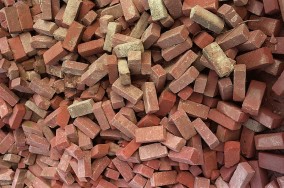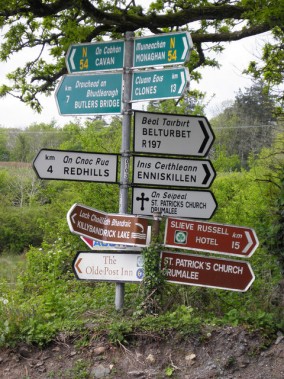
I spent the best years of my life living in a house on Wawona Avenue. That was a nice house. My uncles used to drive up to the Bay Area from Nipomo to face the house in bricks. Took two summers before my dad was satisfied. I hated those bricks, because of how we had to get them.
My dad was a doctor; he could afford to buy bricks, but my dad was crazy. He bought a dump truck, and we would drive around Oakland gathering bricks from wrecking sites. You might think this was a small price to pay for a kick-ass house-face. You would be wrong because what you don’t understand is that we were not only gathering bricks for our current kick-ass house. We were gathering bricks for the kick-ass house that my dad wanted to have built one day on a ranch. Now, we’d watched Young Guns. I was onboard with ranches if it meant I’d get a horse, a gun, and a sheriff to make famous, but I wasn’t trying to build a ranch — and I certainly wasn’t trying to gather the bricks to do it. We spent half of every summer gathering bricks. We had so many bricks stacked in our backyard and along the side of the house (and in the garage) that our white neighbors started complaining about property value. So we had to move the bricks to a lot on MacArthur.
This was the worst thing that could’ve happened, because my father realized, once he’d moved the bricks to a lot where there was a bunch of room for them, that there was no limit to the bricks he could collect. He could build twelve ranches, and his boys could gather the bricks.
Now I hate to complain about a nice house and the twelve ranches we would inherit after we killed Pharaoh and freed ourselves from the bonds of Egypt, but we collected a heap of bricks ten feet high (I know that because the fence was twelve) and half an industrial block long. That was Lot One. Lot Two: I grant that it wasn’t half a block long, but you could walk up the pile of bricks and step onto the roof of the building that shared the lot. We’d built a freaking land bridge.
I hated those bricks; they constituted an assault on my summer vacations, which was an assault on my boyhood. They scraped my fingers raw each morning at dusty wrecking sites as I threw them onto the truck one and two at a time. We complained about our tender fingertips, but my dad thought it was good for us, that ours hands would grow calluses to protect us from our weaknesses.
“I’m raising men,” my dad used to say. He liked to follow such statements by tromping to a pile of rubble and hurling bricks onto the truck at superhuman speeds. He led by example, but it wasn’t as inspiring as one might think. Still, I ground my teeth to keep shocking words from arcing and joined my brothers beside him. Together, we would fill the day with the metallic banging of bricks tumbling across the truck bed. We made a game of it. If we timed it right, our loads would hit in rapid succession, creating a bombardment that would do a battleship proud. I took pleasure in that destructive sound, imagining I hurt the bricks the harder I threw them and hoping that somehow we would sink my dad’s truck.
I became obsessed with destroying that dump truck. The obsession overwhelmed me on the day I threw a fit until my dad relented and gave us work gloves. The gloves didn’t help. They made me feel worse because they were proof that I wasn’t strong enough. With everything to prove, I decided my course: it was the truck or me.
I started with the brake lights, on the theory that my dad wouldn’t drive the truck for fear of tickets. When he wasn’t looking, I’d throw bricks short, aiming for the red blinkers.
“Dog-gone-it! Emile,” my dad said when I finally broke one. He didn’t like to curse around us. “Watch what you’re doing.”
“Sorry.” Lying had never felt so good.
My victory was short-lived, for though the first cop to pull my dad over skipped the warning and gave him a ticket, the truck kept rolling. The bricks kept tumbling into the truck bed, the drum-track to a savage heat born of powerlessness dancing beneath my skin.
A reprieve from bricks came when my dad sent the three of us to live with our mother. We lived with her in Los Angeles for three months, but three boys unfamiliar with the civilizing touch of a woman proved too much for her. If you want a metaphor for our time spent in Los Angeles, think about a bunch of Greeks popping out of a wooden horse to burn Troy to the ground. We left soon after the Rodney King riots, and we may or may not have started those.
When we returned to the Bay Area, my dad had moved out of our kick-ass house on Wawona. We were disappointed to discover that we now lived on that industrial-sized block in the same building against which we’d built a land bridge. On Wawona, squirrels scampered along the telephone lines strung between utility poles, and breezes smelled like evergreens. Now, where we lived with our bricks on MacArthur, prostitutes strolled alongside gutters, and everything smelled like gas.
Tumbling bricks filled our summers once more. My father added half our weekends during the school year, and it felt like salt in the wound of losing our house on Wawona.
We gathered bricks for a house we knew we’d never build. Every time my father drove us for hours, past Pleasant Hill to rich towns with even more pleasant names, every time he’d pull up on a plot of country land, and each time he’d brag that one day this land would be our birthright, I became angrier. During those years, all of my emotions were storms. I will be in my 20s before I learn to dance in the eye of my self-destruction, but when I was 12, I was thunder in flesh.
I thought I might explode if I had to spend another day gathering bricks. One night I slipped out of the house to slash the truck’s tires with a kitchen knife. Sabotage proved more difficult than television portrayed it. Undaunted, I let the air out of all the tires with a concrete chip.
The next morning my father surveyed his flat tires, hands on his hips, slowly shaking his head as a dark flush crept over his light brown face. My brothers joined my father, shaking their heads at the shame of it all, but wide eyes swung like pendulums toward me between shakes. I don’t remember whether I had told my brothers ahead of time about what I planned to do or they just knew my handiwork, but they knew I had flattened the tires. I didn’t know what they were thinking, but perhaps they were as excited as I felt. Perhaps in their minds, I was a tiny, black Moses calling down plagues to stop this fucking truck. Perhaps they were as shortsighted as I was and forgot to figure in the fact that an AM/PM gas station sat across the street. In any case, my dad jacked up the truck, rolled four tires across the street, and we were back at work that afternoon.
I felt ridiculous as the four of us squeezed into the truck’s cab. I was losing this war I had declared against a truck that didn’t care whether it won or lost. I wasn’t a graceful loser.
So I cut the truck’s brakes.
Every morning that we worked, my dad would unlock the padlock on the sliding fence; one of us would man it while the other two waved my dad through. He would back out all the way to the street. We would then close the gate; Eddie would lock it because he was the oldest and strongest, and we would jump in the truck. I figured my dad had plenty of time to figure out the brakes didn’t work between the private parking and the street where American cars cruised by two or three at a time, but it was inevitable that he would crash into something or someone. I wish that I could say that gave me pause. It didn’t. I was afraid, not for anyone’s safety but of failing or getting found out. That fear was the basis of my commitment. Little punks with soft fingertips got scared. I had to be hard, like bricks. My dad was raising men.
Eddie rolled the fence open, and I couldn’t help but think how much the fence’s wheels looked and sounded like training wheels rat-a-tatting. Gears ground with a sound like ripping metal sheets, and the truck jumped on its frame as it shifted out of park. Eddie manned the open gate a dozen inches off the truck’s right bumper. Timi and I stood at a marginally safer distance on the truck’s left. The truck came at the gate opening like a prowling shark.
If it swerved right, Eddie was dead. If it swayed left, it would mow down Timi and me. Butterflies barrel-rolled up my anus at the thought, but I stood my ground. Today would be the rest of my life.
Fuck this truck.
Its brake lights flared red, and the truck jerked. It coasted atop the high whine of thin brake pads on disks, easing to a near stop when it passed between the gateposts. I realized Timi was directing my dad through while I stood there with my dry mouth catching errant exhaust. The brakes still worked. This truck was unstoppable.
When we returned home with our first load, I discovered why the brakes still worked.
The night before, I had crawled under the truck, searched, and found the only wires in any proximity to the rod that ran down the truck’s center. That was part of the drive train — one of the three things I knew about cars or trucks — and the drive train controlled the wheels. In my mind, brake lines had to be related to what controlled the wheels, and lines would be the same thing as wires. So, I’d located four colorful wires that ran from a housing beneath the truck bed into the back wall of the cabin. Unsure of which one governed the brakes, I had cut them all.
I had cut the wires that connected the switch my dad flicked to dump the bricks to the rods beneath the bed. My dad now owned a dump truck that couldn’t dump. The wires were never reconnected. We spent the next two years unloading the truck by hand.
I finally learned how to slash a tire. I’d found a butterfly knife in a sandbox and educated myself on the indelicate art of tearing shit up and then sideways. I cut two tires and bought us a couple weeks of reprieve. Sand in the gas tank bought us six months.
I think my father by this time knew what I was doing. Thinking of him now, I can see more sadness than anger on his face. Now that I’m a father, I can feel his desperation flooding across space, time, and death. He was desperate to keep his sons’ hands busy doing something other than playing with butterfly knives dug out of sandboxes. His father failed him in a different way, but he didn’t want to fail us in any way. That was my father’s war.
Things get confusing in war. I didn’t know what my dad was fighting for; I felt like he fought against my brothers and me. His success was doomed because my father was raising teenagers who believed they should’ve been men four years ago. We fought back. The three of us comprised one drowning Titan. My dad did his best, with all the lessons that his father never taught him, to pull us from the water. But we were panicked by a world that spilled over the tops of our heads. He would have to let us go, or drown with us.
Imagine a good doctor giving up on his patient. Imagine my father giving up on us.
I have stories about how he tried to let go, but we dragged him to the bottom of the sea. I used to hate how religious my father was, how morality seemed more important to him than the sons to which he tried to teach it. I hate even more that by the time this story ends, my father will be a drug dealer just like the sons that he judged so harshly. He will be alone on the steps of another office, shot and bleeding his dreams across the bricks.
Emile DeWeaver grew up in California’s Bay Area. His short fiction, “Superman,” was published in the Lascaux Review and nominated for the 2015 Pushcart Award. He also has a forthcoming piece in Nth Degree. When he isn’t writing, he spends his time impersonating the most interesting guitar player in the world.





